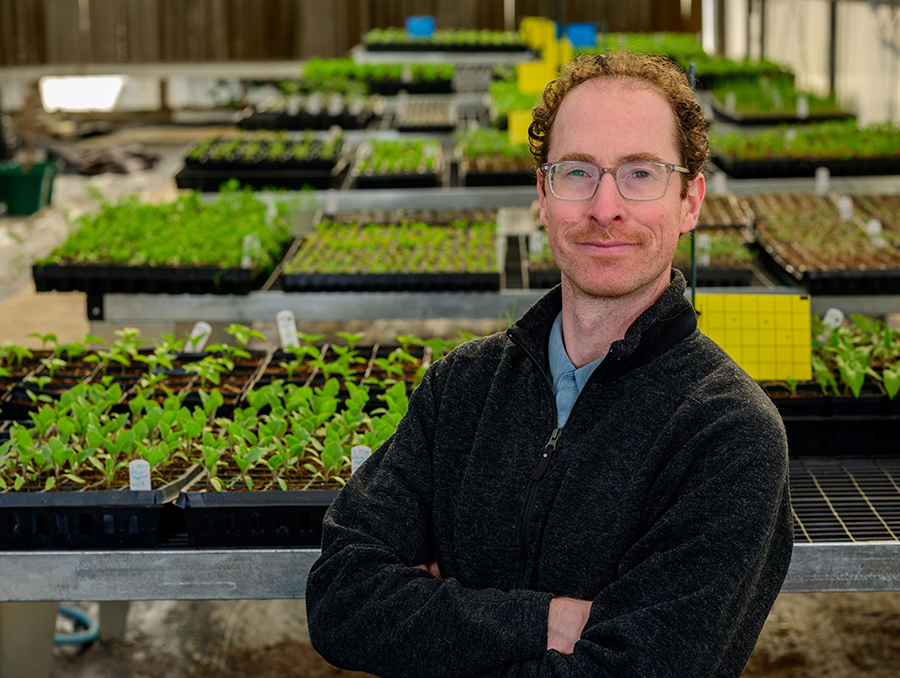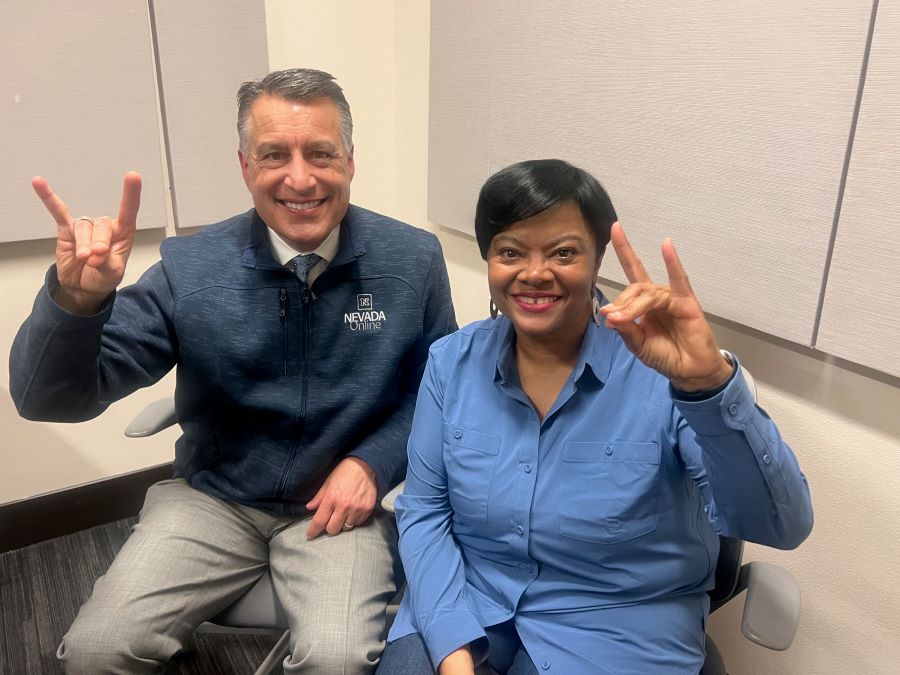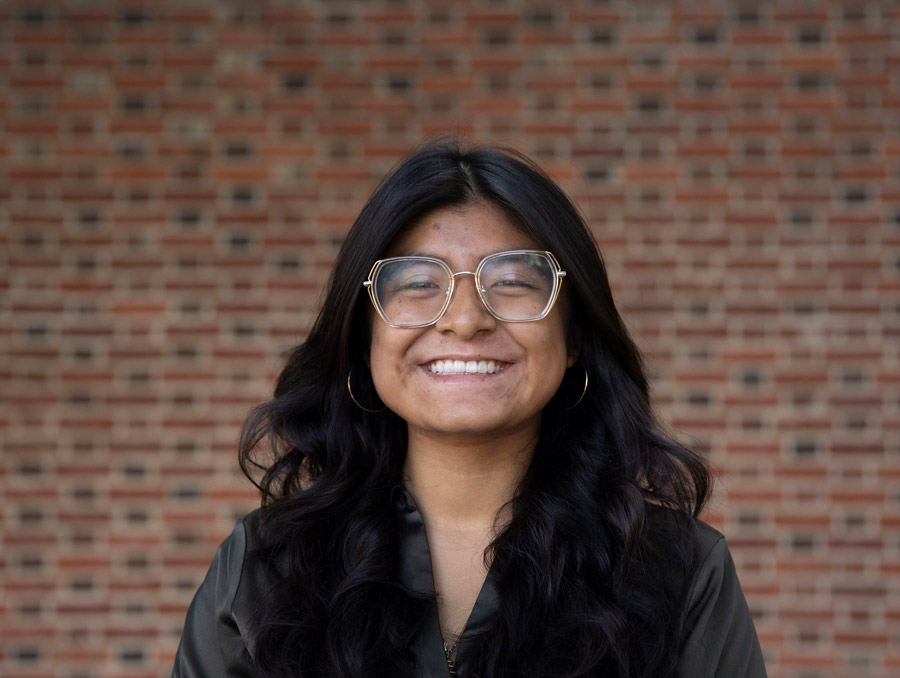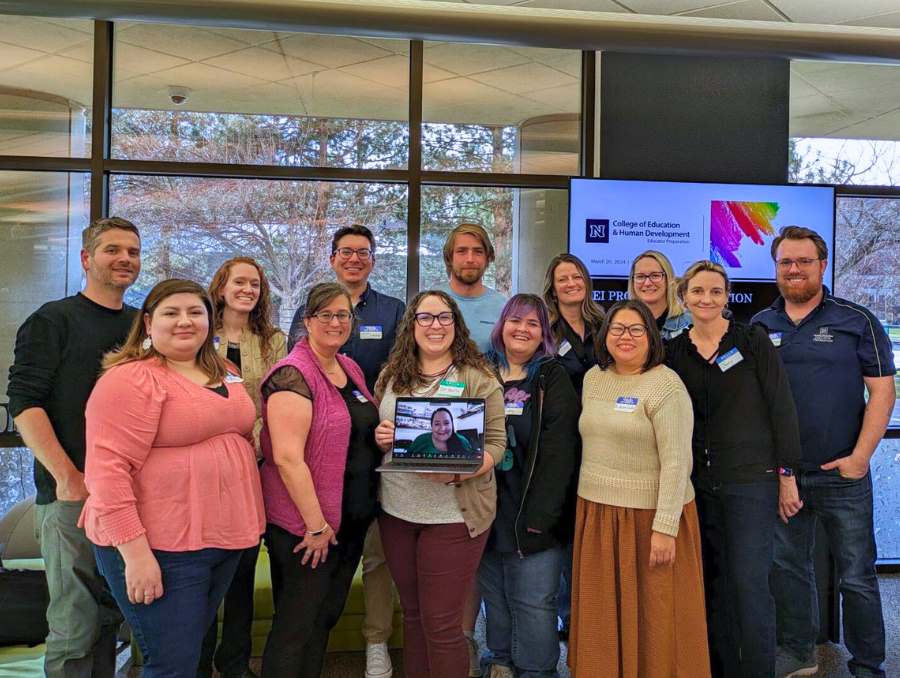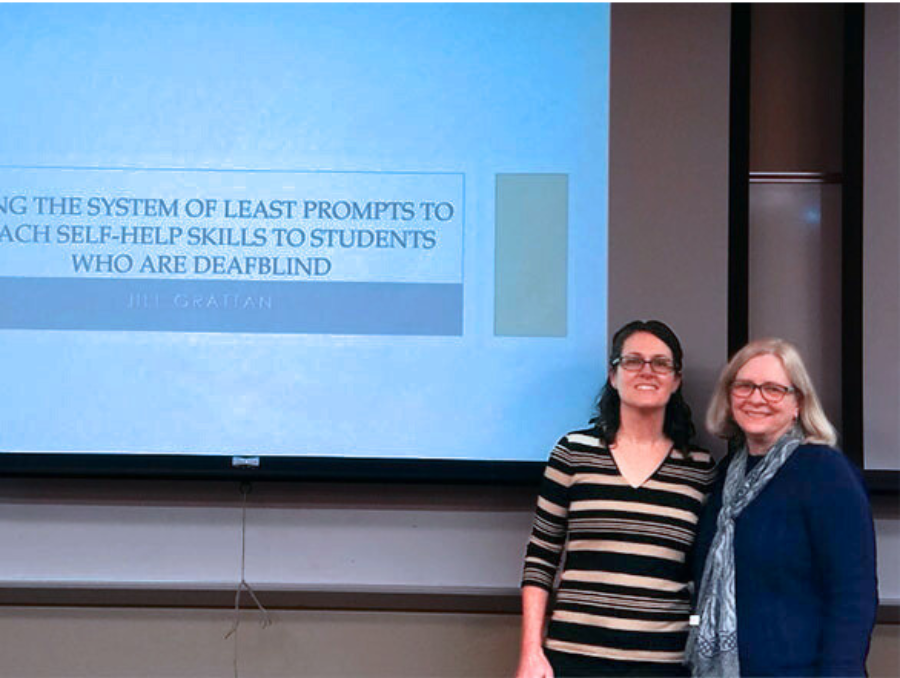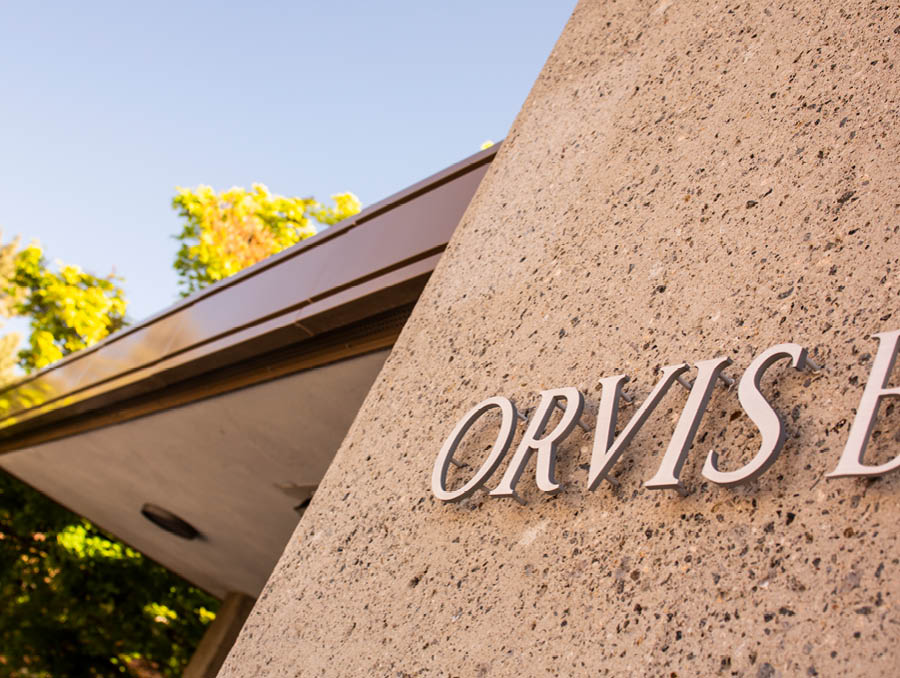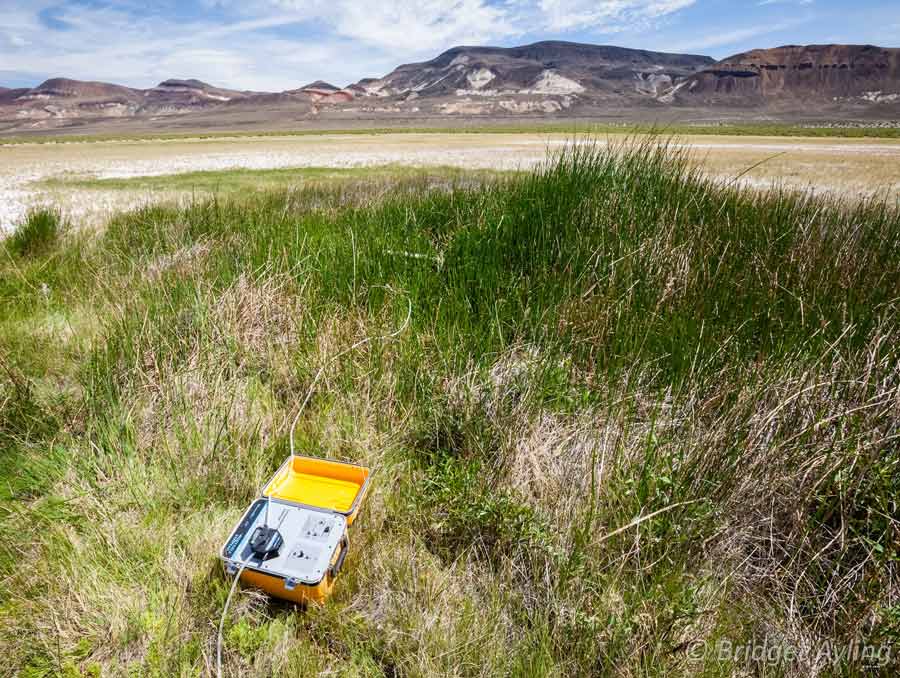Kristen Kabrin has worked at the University of Nevada, Reno as an administrative assistant for 19 years.
For the first 18 years or so of her time at the University, Kabrin was like many others on campus. She knew that there were a lot of interesting and noteworthy things going on across campus, but was often too busy to find out first-hand what they were.
That has all changed in the last year. As chairperson of the Staff Employees Council, Kabrin is part one of the campus' most important elected bodies. Serving the needs of the institution's more than 1,000 classified employees has proven to be a busy, yet rewarding job for Kabrin.
"It's been time-consuming, but I've seen more parts of campus and met more people than I could have ever imagined," Kabrin said recently during an interview in her office in the Department of Political Science in the Mack Social Science Building. She has been a part of the Department of Political Science for the better part of a decade. "There is always a tendency to get focused on your area, and you tend to forget that you're part of a much larger community. I've found this out in the last year.
"I was joking with the (SEC) executive board that as chair, you really do get your exercise ... I've been to the south end of campus to the furthest north end of campus, and everywhere in between. It's been fun. It's been challenging, but it's been fun. I've made amazing contacts all through campus."
It is this willingness to explore all aspects of the campus, and to find ways to include all constituent classified groups, that has characterized Kabrin's tenure as chair to this point. She's quick to point out previous SEC chairs, such as prior chair Erik Williams, laid the groundwork for a more proactive SEC approach.
During a conversation in Kabrin's office, the University graduate (degree in Political Science) who is in process of completing her master's degree program in Educational Leadership, shared her thoughts on what the SEC has done thus far in the academic year, and what it has planned for the spring.
Question: What is the SEC's role and how can people become involved?
Kabrin: The Staff Employees Council is a representative body for the entire classified staff within the University. It includes all of the classified staff on our campus, as well classified staff who work off campus for units like Cooperative Extension. We're a representative body and we help as issues come up.
There are two ways you can become involved. One is you're elected to the SEC, and a term is for three years. If you're not elected, you can still play an important role. We encourage everyone from the campus to attend our meetings. We've worked to streamline our process at our meetings, because if you're not directly involved with the council, it can be very difficult to get the time to come to our meetings.
We have our guest speakers show up at 2:45 every meeting, because it might be easier for a person to get away for a half hour to hear the guest speaker. We handle everything upfront, and then let our guest speakers come in to talk about some of the important issues that are happening on our campus.
Question: What are some of SEC's key events?
Kabrin: We have our Open House, which will be held on March 14 in the Joe Crowley Student Union Ballroom A, and our Employee Recognition Reception, which is scheduled for June 12 in Ballrooms A, B, and C.
The Open House brings in vendors that the campus uses on a regular basis. There are other opportunities as well, such as financial institutions, banks and other services. We have raffles with prizes from the vendors, and it's generally an opportunity for the classified staff to know what's out there.
(Editor's note: According to the Vice President of Administration and Finance's office, while administrative leave has only been granted for attendance at the Classified Retiree and Recognition Receptions in June, the University is asking supervisors to be flexible that day and work with those employees who wish to spend time at the Open House event.)
The Employee Recognition Reception changed its format last year. We've made it more of a reception and tried to make it easier for everyone to get involved. It still honors those who put in the service time at the University, and it recognizes the Classified Employees of the Month for the past year, as well as awards the Distinguished Classified Award.
Question: You've put quite a lot of emphasis on the Classified Employee of the Month Award over the past few months. Why?
Kabrin: The Classified Employee of the Month recognizes any classified employee for doing an outstanding job on campus. Right now we're trying to dispel the myth that only a supervisor can nominate you. Any faculty, any student, any other classified staff member can nominate a classified employee for the award. Nominations are due the first of the month for the following month. You get a lovely certificate suitable for framing; rewards that you can receive at the Bookstore; your name goes into a drawing at the recognition reception ... each employee of the month name goes into the drawing ... and you can receive a free parking permit in the Whalen Parking Garage if your name is drawn.
Another benefit of the Employee of the Month award is if, you're selected, you get coffee with the president. President Johnson sits down, gets to find out a little bit about you, and you get to tell him what you do on campus and what your concerns and thoughts are. One of our recent winners, David Carolla in IT said he really enjoyed the experience and found it amazing to sit down to get to know President Johnson a little bit better. He said he was initially nervous, but he said it was wonderful.
Why is the award important? With the salary cuts and furloughs, morale was a little low, and how I view this award is as a visual thank you. We know you're doing more with less, and things are a little crazy at times, but this is our way of telling you thank you. You also get a write up in Nevada Today and there is an interview on the SEC website with each month's winner.
We're also actively looking for Distinguished Classified Employee nominations. They're due by March 8. A nominee must have five continuous years of service, either as a full time or part time employee. It's an amazing award, and the letters that come in about our people are really inspiring. These are amazing people who have put in a lot of hard work to get the job done.
Question: It seems over the past couple of years, the SEC's clout on campus has increased. Is that true?
Kabrin: The last couple of chairs have started to move us into a more proactive council. Erik (Williams) was part of the search process for the new president, for example. We've been involved in high-profile searches. As big vendors come into campus, our input is sought and we bring the information to our members.
Question: You mentioned earlier that we have 1,039 classified employees. What are some of the concerns they've shared with you?
Kabrin: Everyone has been concerned with the salary cuts and the furloughs. They understand that we work for the University of Nevada, Reno, but as classified staff we're employed by the State of Nevada. They understand the difficulties that we face, and a lot of that is out of our control. But for the newer members who have just joined the council, you get the sense that they really want to work to make the best of a difficult situation. We have eight standing committees, all with recent charges, and we have three new members on our benefits and compensation committee who are going full steam ahead in trying to find any extra relief for our staff, even if it's finding ways to help employees get discounts on their cell phone bills. It doesn't fix the situation, but we're trying to make it a little bit easier for people as we get through a challenging time.
Over the last two years, we've tried to become more inclusive. There seems, sometimes, to be this distinction ... there's the faculty ... there's the students ... and there's the classified. But the impact of budget affects everybody, it affects us all. Recently we reached out to Faculty Senate, and they've been great and agreed to let one of our members of our benefits and compensation committee be part of their benefits and compensation committee. So there is more inclusivity on our campus, which is a great thing. We don't want the work to be "me" work; we want all this work to be an "us," "us" as a community work that benefits all these important groups.
Question: Other accomplishments you're proud of?
Kabrin: We're bringing in more guest speakers at our meetings that fall in line a lot with Faculty Senate. We now have presenters who are giving information in Faculty Senate who are also meeting with us. (Current Faculty Senate Chair) David Zeh and (past Faculty Senate Chair) David Ryfe are going to share their report on the Future of the University with us at our next meeting, for example.
Our big charge this council year is to get the word out: who we are, what we do, the events that we hold. We'd like to have more people at our meetings. President Johnson also speaks at our meetings. It's one thing gathering the information from our minutes as opposed to being there. You can get a lot more from it being there as opposed to reading the minutes.
Question: Kristen, it's obvious you really do enjoy your role, not only as chair of SEC, but here in the Department of Political Science. What fuels you?
Kabrin: I work with amazing people. It's as simple as that. I have a chair of the department (Eric Herzik) who's been amazing to me and been incredibly supportive of everything I do, whether it's work, going to classes, when I go to council meetings, all of it. When I said I was being nominated for chair of the council, Dr. Herzik understood the time commitment and he never batted an eye. Having that kind of support, the least I can do is give my job everything I have.
In addition to a great department chair, there are still 12 other people here. When I'm away, it impacts them. If I'm not there, things aren't getting done, but all of the department's faculty, they're all so supportive of everything I do, to do the council work, to graduate from my graduate program ... when you work with good people, you want to put out a good product. Everyone in this department is so passionate about their work, and their students, it's infectious ... it makes you just as passionate. I don't feel like I'm the department's administrative assistant. We have a very collegial environment, and it feels very collegial to me. I feel like I'm part of the team. I'm part of the department of political science. Given all that, how can you not love what you're doing?




